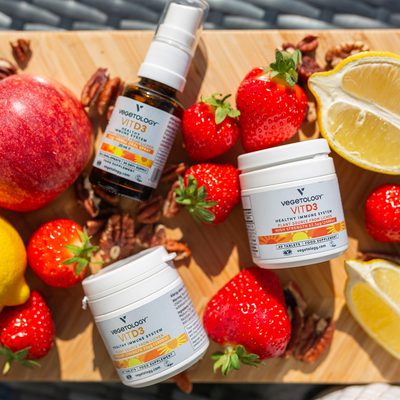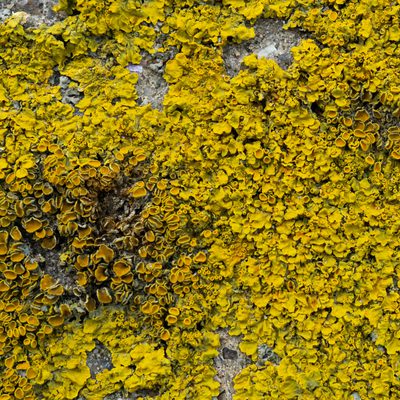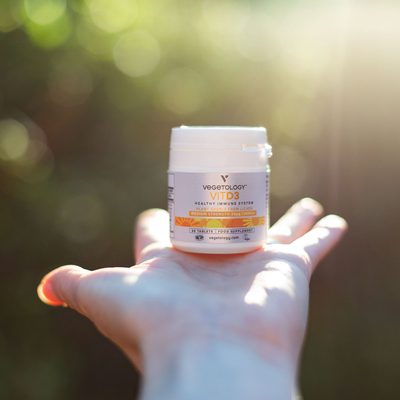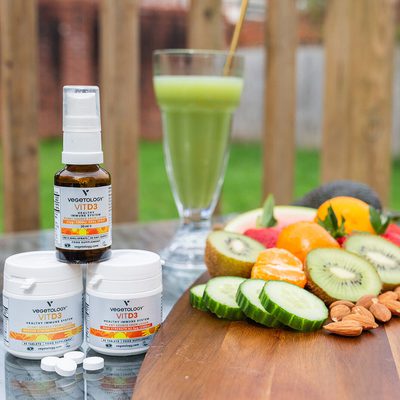
When we talk about vitamin D supplements, most people don't realise where that D3 actually comes from. The answer might surprise you. It's sheep's wool. And if you're following a plant-based diet or simply care about where your supplements come from, this matters.
What is Lanolin?
Lanolin is a waxy, fatty substance that's derived from sheep's wool. It's secreted by the sheep's sebaceous glands to coat their wool, providing water-resistant properties that protect them from environmental conditions. After sheep are shorn, the wool is washed in hot water with detergents to extract this greasy substance.
Lanolin is a by-product of the wool farming industry, which is why it's not used by the vegan community or many in the vegetarian community. But the issues with lanolin go beyond just its animal origin.
Why we looked for an alternative to lanolin
For those following a plant-based lifestyle, lanolin presents a clear conflict with vegan values. As a by-product of the wool industry, it connects your daily supplement directly to animal farming—something many people prefer to avoid when plant-based alternatives exist.
The wool industry, like most animal agriculture, operates on a commercial scale where welfare standards can vary significantly. For people committed to plant-based living, or those simply wanting to make more ethical choices, this matters when selecting everyday products like vitamin supplements.


Here's an interesting fact: sheep are routinely treated with pesticides through a process called "sheep dipping" to protect them from parasites like mites, lice, ticks, and blowflies. Common treatments include various pesticide compounds.
Because these chemicals are fat-soluble, they can accumulate in wool grease. While pharmaceutical-grade lanolin goes through extensive purification to reduce residues, the question many people ask is: why not choose a source that doesn't require this level of chemical processing in the first place?
This is where plant-based alternatives shine. Lichen cultivated in controlled conditions offers a naturally clean source—no pesticides needed, no extensive chemical processing required.
Understanding Vitamin D: D2 vs D3
There are two types of vitamin D that matter when it comes to supplementation:
Vitamin D2 (ergocalciferol): Derived from plants, particularly mushrooms exposed to UV light. While plant-based, it has a significant drawback.
Vitamin D3 (cholecalciferol): Traditionally derived from lanolin or fish oil. This is the form of vitamin D that your body produces naturally when your skin is exposed to sunlight.
Here's the key difference: research consistently shows that D3 is significantly more effective than D2 at raising and maintaining blood vitamin D levels. Studies have demonstrated that D3 better meets the body's requirements. For people relying on supplements to maintain adequate vitamin D status—especially those following plant-based diets or living in northern climates with limited sunlight—this difference is important.
This is exactly why we were so excited to develop a plant-based D3 option. Now vegans and vegetarians can access the most effective form of vitamin D without compromising their values.
Our solution, vegan vitamin D3 from lichen
At Vegetology, we don't believe in compromises. That's why we developed a vegan Vitamin D3 alternative to lanolin—and it comes from a remarkable plant source called lichen.
Lichen is a small, unique plant species consisting of a symbiotic association between a fungus and an algae (or cyanobacteria). These organisms live together in a mutually beneficial relationship, forming a composite organism that's different from either component alone.
Lichen grows naturally on mountainsides, rocks, and trees in abundance across the globe. As a survival mechanism against UV radiation, lichen produces its own vitamin D3 when exposed to sunlight—just like human skin does.
Chemically Identical: The vitamin D3 extracted from lichen is identical to lanolin-derived D3 in every way except the source. Your body uses it exactly the same way—there's no difference in bioavailability or effectiveness. Scientific testing, including NMR analysis, confirms the chemical identity.
100% Plant-Based: No animal exploitation. No connection to the wool or meat industries. Suitable for vegans and vegetarians.
Pesticide-Free: Unlike lanolin, which carries the risk of pesticide contamination from sheep dipping, lichen is cultivated in controlled conditions without any pesticides. It's a cleaner, purer source.
Sustainable: Lichen is naturally abundant and easy to grow. Cultivation has minimal environmental impact—no intensive farming, no overgrazing, no methane emissions from livestock. It's produced using processes that don't deplete natural habitats.
Approved & Certified: Our world's first lichen-based Vitamin D3, branded originally as Vitashine, is proudly registered with The Vegan Society and is Vegetarian Society Approved.
The science behind our innovation
We didn't create this alternative on a whim. This was the result of dedicated research into plant-based nutrition and a commitment to finding solutions that don't compromise on effectiveness.
Lichen naturally contains provitamins D (7-dehydrocholesterol and ergosterol). When exposed to UV light at specific temperatures (below 16°C), these convert to vitamin D3 through the same process that occurs in human skin. The result is cholecalciferol—pure, plant-based vitamin D3.
The extraction process maintains the integrity of the vitamin while ensuring pharmaceutical-grade purity. What you get is a supplement that performs identically to animal-derived D3, but aligns with plant-based values and environmental responsibility.

Who needs vitamin D3?
The answer is: nearly everyone. Vitamin D deficiency and insufficiency are widespread globally. In the UK, it's estimated that a significant portion of the population has inadequate vitamin D levels, particularly during autumn and winter months.
Vitamin D3 is essential for:
Bone health: Crucial for calcium absorption and maintaining strong bones and teeth
Immune function: Supports your body's natural defense systems
Muscle function: Important for maintaining healthy muscles
Mood regulation: Vitamin D receptors in the brain suggest a role in psychological wellbeing
General health: Linked to cardiovascular health, cell growth, and numerous other physiological processes
You're particularly at risk of deficiency if you:
Live in northern climates with limited sunlight
Spend most of your time indoors
Have darker skin (which produces less vitamin D from sunlight)
Are over 65 (skin becomes less efficient at producing vitamin D)
Follow a plant-based diet (few plant foods naturally contain vitamin D3)
Are pregnant or breastfeeding (increased vitamin D requirements)
Our vitamin D3 products
We offer our lichen-based Vitamin D3 in a variety of formats to suit every lifestyle and preference. Our Vitamin D3 Spray (1000iu) is ideal for children or anyone who finds tablets difficult to take, providing easy, precise dosing with rapid absorption. For those who prefer tablets, our chewable Vitamin D3 options (1000iu and 2500iu) can be chewed or swallowed, making them simple to incorporate into any daily routine. We also offer a high-strength version (2500iu) to meet different needs, whether for daily maintenance or addressing a deficiency.
All of our Vitamin D3 products are 100% vegan and vegetarian, free from animal products, non-GMO, and free from gluten, wheat, and dairy. Made in the UK to rigorous quality standards, they are registered with both The Vegan Society and Vegetarian Society, ensuring you get a safe, ethical, and reliable supplement every time.
